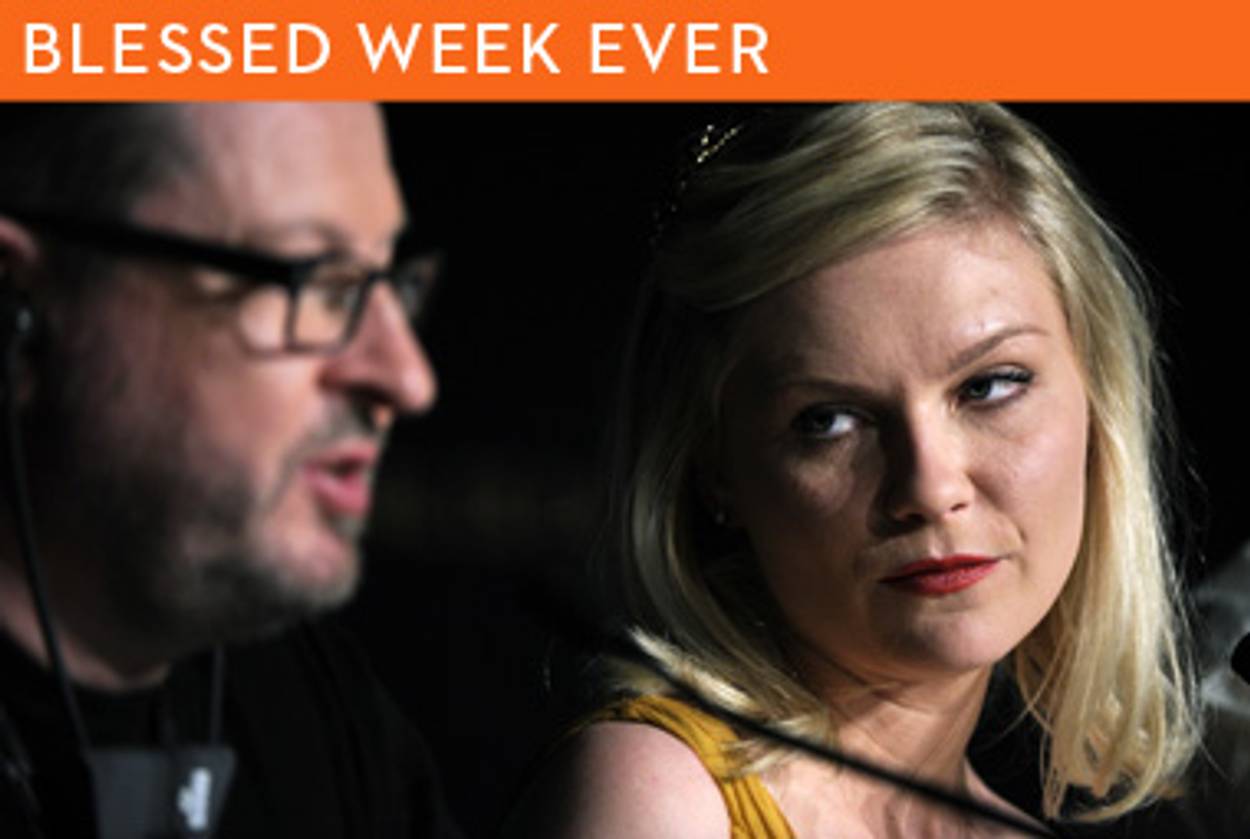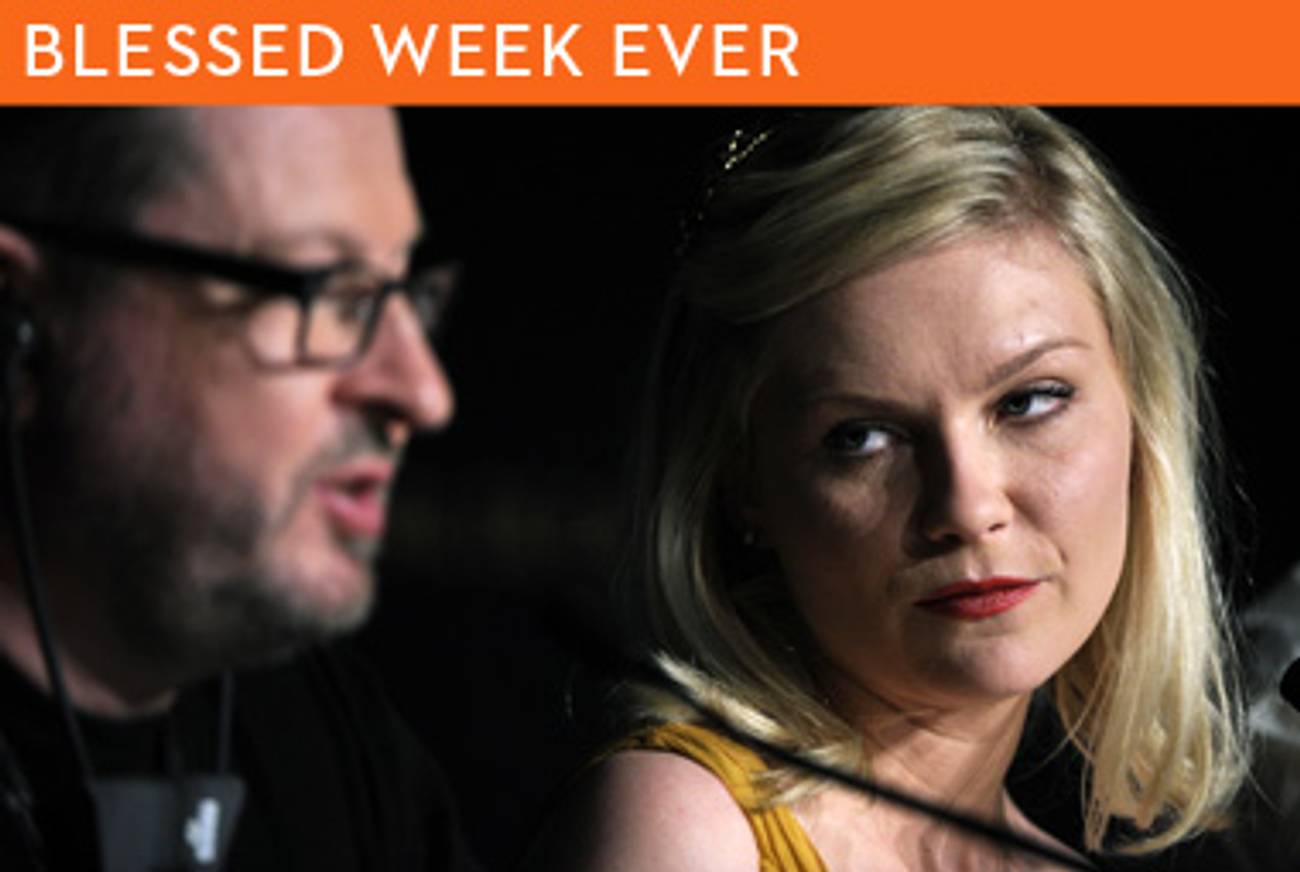Heilstorm
Sympathizing with Hitler—as Lars von Trier did this week at a much-publicized press conference at the Cannes film festival—may be the most Jewish thing the director has ever done




Speaking earlier this week at the Cannes film festival, the Danish director Lars von Trier stirred up a bit of controversy. Sitting on the podium at the gala premiere of his new film Melancholia, a confused Kirsten Dunst by his side, the acclaimed filmmaker suddenly began to wax poetic. About Hitler.
“I really wanted to be a Jew,” he said, in response to a question about using Wagner in his latest film’s soundtrack, “and then I found out that I was really a Nazi. Which also gave me some pleasure. I understand Hitler. I think I understand the man, he’s not what you would call a good guy. But I understand much about him. And I sympathize with him a little bit.”
Cue the requisite media maelstrom: As soon as von Trier was done talking, bloggers blogged, pundits pronounced, the festival’s organizers mumbled a few disapproving words, and the din, as is usually the case with things of this sort, grew too loud for anyone to make any sense of the situation.
Let us, then, attempt to parse von Trier’s strange utterance. By which, to be clear, I mean not necessarily the actual statement—a notorious prankster, the director is perpetually in the habit of stirring sensations, both on film and in life, and might have well conjured his latest comments as a maladroit, if ultimately successful, attempt at controversy—but rather the meaning that lies at the other end of the outrage and the buzz.
To do that, we must zoom in on von Trier’s childhood. Raised by parents who were committed communists and zealous nudists, the director nonetheless grew up with a vague sense of Jewish identity, as his father, Ulf Trier, was a Jew. But Ulf Trier, it turned out, wasn’t really von Trier’s father: As she lay dying, the director’s mother confessed that his biological father was really her boss, a German by the name of Fritz Michael Hartmann.
As with most deathbed confessions, hers, too, was rich in pathos. “Before she died,” von Trier recalled the moment in a 2005 interview with the German weekly Die Zeit, “my mother told me to be happy that I was the son of this other man. She said my foster father had had no goals and no strength. But he was a loving man. And I was very sad about this revelation.” Hartmann, the mother said, had come from a long line of classical musicians, and she believed that by becoming pregnant with his child she would produce an artistic genius. “You then feel manipulated when you really do turn out to be creative,” von Trier mused. “If I’d known that my mother had this plan, I would have become something else. I would have shown her. The slut!”
The statement, of course, is enough to keep legions of psychoanalysts busy throughout a long, happy career. But note this—as soon as the interviewer asked von Trier about his personal life, he repeated more or less the same thing he had said at Cannes. “Until that point I thought I had a Jewish background,” he said at the time. “But I’m really more of a Nazi.”
Strange as it may seem, this week’s parasha is a perfect prism through which to observe l’affaire von Trier. The bulk of it consists of a very wrathful God, threatening his people with all manner of horrors should they defy his will. What horrors? The pleasure is in the details: “You will sow your seed in vain, and your enemies will eat it.” “I will incite the wild beasts of the field against you, and they will bereave you, utterly destroy your livestock and diminish you, and your roads will become desolate.” “You will eat the flesh of your sons, and the flesh of your daughters you will eat.” This is every bit as gruesome as, say, the bloody castration scene in von Trier’s last film, Antichrist, which shocked critics at Cannes when it showed there in 2009.
Precisely what it is that would warrant the cannibalization of one’s own children, God doesn’t say. Nor, by the way, does he explain how the devoured-kids business squares with the purported prohibition on punishing children for the sins of their parents. But let us not get too legalistic; the main thing that the parasha wants us to take away is the real and devastating wrath of which God is capable should we forget our ways and stray away from the covenant. This rage is irrational, irrevocable, pure. If he wasn’t capable of great and terrible violence, goes the logic, God’s subsequent mercy would be nothing but mush.
Let us now jump back to that deathbed in Denmark. What he thought was his affinity to the kind and loving Jew was eclipsed by the existence of the imperious and cold German, who met his biological son a few times later in life and then refused all further contact. It’s little wonder that von Trier went on to make films that highlight the unending potential for devastation to rise even amid the most serene settings and insisted—most notoriously in his Dogme 95 manifesto—on the sort of filmmaking the sanctifies honesty and rejects artifice. He realized that once we drift from the spiritual essence that makes us who we are, a Hitler, figurative or literal, is likely to emerge, a horror so ghastly it can leave nothing in its wake but ruin.
That, perhaps, is the overarching theme of all of von Trier’s films, and it is also the theme of this week’s parasha; both urge us to never forget our covenants—with God, with each other, with ourselves—or risk terrible pain. In a strange way, saying “I am a Nazi” may be the most Jewish thing Lars von Trier has ever done.
Liel Leibovitz is a senior writer for Tablet Magazine and a host of the Unorthodox podcast.
Liel Leibovitz is editor-at-large for Tablet Magazine and a host of its weekly culture podcast Unorthodox and daily Talmud podcast Take One. He is the editor of Zionism: The Tablet Guide.